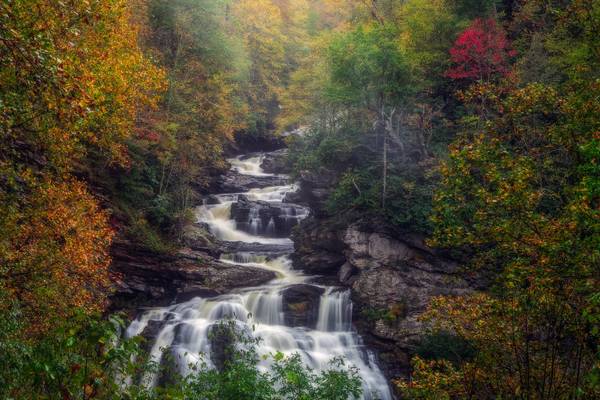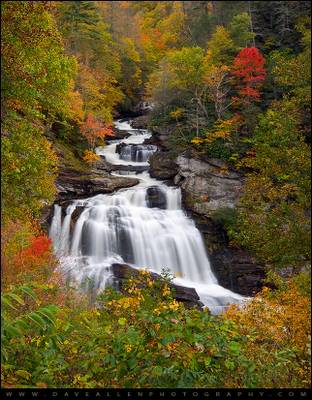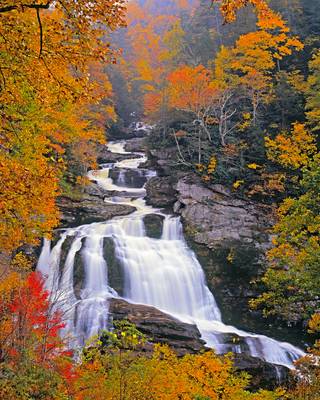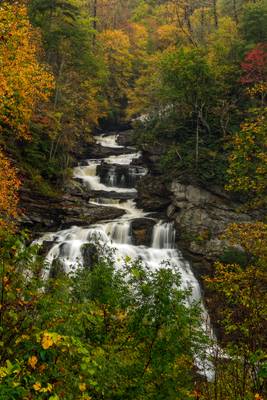
Cullasaja River

by Michael Kight
In 1540, Spanish Conquistador Hernando de Soto and his men explored Cullasaja Gorge in their quest for gold. The cascades here stretch for about a fifth of a mile across densely forested rugged terrain before making a final drop into the gorge from Cullasaja Falls. It makes you realize that had to have been a particularly mean hike for the conquistadors… they would have had a better time of it had they marched up here at highway NC64 where I shot this from.
There’s a short pulloff on NC64 between Highlands and Franklin, North Carolina, where you get the best view of Cullasaja Falls, which, to me, is the most impressive waterfalls in the state when the water flow is good. It was raining this day, with even a wisp of cloud evident in the image… and you couldn’t ask for better light to make the autumn colors pop. This “spot”, however, is at the apex of a blind curve and very close to the edge of the road… I've watched people stand in the road for “selfies” here, oblivious to how fast a vehicle will suddenly appear at either end of the curve. You need to use your noodle here or you’ll wind up as noodles on the pavement!
For as beautiful as it is, the face of the waterfall has become occluded over years by a scraggly rising foreground. I didn’t include it in this image for that reason. I do understand that it is the least of our problems in this world but being that it draws so many visitors to this neck o’ the woods, it would be great to see the view cleaned up… maybe we should start a petition. Who knows? It just might happen.
If you didn't know, Cullasaja is a Cherokee word meaning honey locust place. The honey locust is a tree. The name derives from the sweet taste of the legume pulp, which was used for food by Native American people. The long pods, which eventually dry and ripen to a leathery skin that sticks to the pulp within. The pulp, which is bright green in unripe pods, is strongly sweet, crisp and succulent in ripe pods. Dark brown tannin-rich beans are found in slots within the pulp. It can also be fermented to make alcoholic beverages… the Cherokee were obviously an advanced civilization!

Cullasaja Falls is a gorgeous waterfall in the Blue Ridge Mountain of western North Carolina outside of Highlands, NC.
Single exposure with a...

by Michael Kight
Seen roadside off NC64 between Highlands and Franklin, North Carolina, Cullasaja Falls is one of NCs most impressive waterfalls. It is the last major waterfall on the Cullasaja River as it drops into the rugged Cullasaja Gorge. In 1540, Spanish Conquistador Hernando de Soto and his men explored the gorge in their quest for gold. If you've ever seen this area, you'd realize that had to have been a particularly mean hike.

by Michael Kight
Cullasaja Falls is perhaps my favorite waterfall in North Carolina, and has been since my first encounter there many moons ago... but it's getting quite overgrown of late. I keep hoping the state realizes the economic impact of these highlands, and clears out the growth occluding the bottom tier of these falls, as it used to be.
The word Cullasaja is a phonetic derivative of a Cherokee word meaning "the honey locust place". Honey locusts are trees with pods of large seeds that are quite sweet... the Cherokee not only ate them, but also brewed a kind of beer from them. They named a settlement near here Cullasaja, which now is the town of Franklin... with a name like that, there must have been good times here, once upon a time.
Cullasaja is also the name of the river of which flows at the falls and the deep gorge that creates it. This view can be seen roadside along NC Hwy 64 in a narrow section where there's just enough room for a few cars to pull off. Most folks pass by without ever seeing it, as this road makes many a flatland driver nervous... but often, as I have a tripod set up, many stop out of curiosity... and they are not disappointed. I love seeing their expression at first sight. It's evident that many good times can still be had here. As one visitor stated as I was getting this image, "It truly is God's country!" I agree wholeheartedly.
I posted an image similar to this many years ago, though of scanned Fuji RVP 120 film (which was quite saturated)... you can see the difference between then and now. You can see a bit of pop in the colors in this image due to a deep overcast and rain... I polarized out reflections for a bit more color.
Thanks to all Phoide contributors to Cullasaja River!
Most notably Michael Kight.